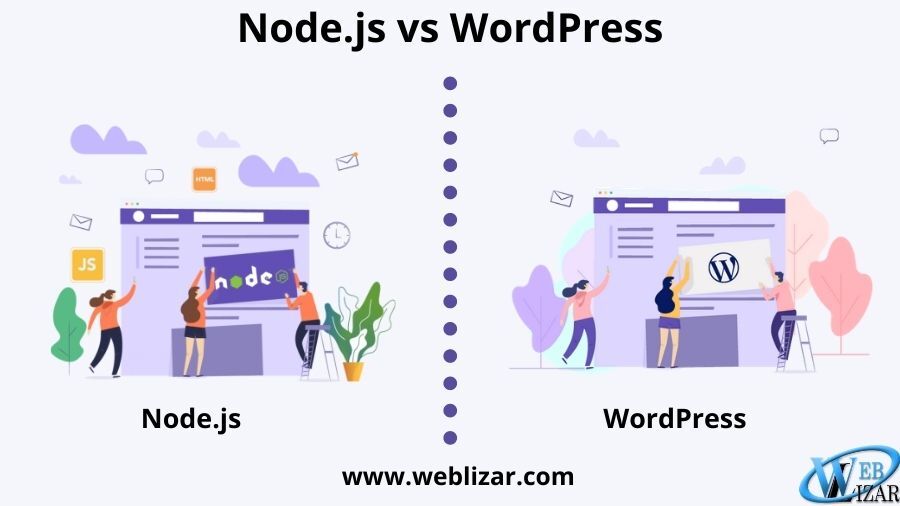Node.js vs WordPress: Your Inside Guide

- Node Js Database , Node Js Pages , V8 JIT Advantage , WordPress Power
- Node Js Database, Node Js Pages, V8 JIT Advantages, WordPress Power
Node.js vs WordPress: What is the difference between PHP and Node.js? How does this affect the world of web applications and WordPress? These are just some of the questions that many people who are using WordPress want to know. For those who are accustomed to using PHP, you may be a bit challenged to switch to Node.js.
How will this change what you have been doing previously? Will this be more of an assistance or a hindrance? With all the information available at your disposal, websites like Node.js database, and these guidelines, your transition may not be as complicated as it may seem.
Basis Of WordPress Power
Although WordPress is generally thought of as the great engine of blogs, it is a CMS, a content management system, which provides significant code to the internet.
As a basis, WordPress powers more than 25% of the websites in the world. A sudden change in WordPress means a giant transformation for the web itself. With WordPress changing its administration interface from PHP to Node.js, you may be wondering how this can be more effective for you concerning the work you do and how it can be a proper alternative.
Node.js Vs WordPress
WordPress is a content management system that is open and based on Hypertext Preprocessor (PHP), which features a template system and a plug-in architecture. Node.js is an open-source, cross-platform JavaScript, that provides the proper environment for JavaScript code. WordPress can handle using server-side and User Interface (UI), such as My Structured Query Language (MySQL).
However, you can also design a custom API using Node.js that can also be used in WordPress because both Node.js and WordPress are individual servers themselves. Should the situation arise that you will need to integrate WordPress, you will then have to use API interactions to run inside Node.js. As WordPress has its PHP which can run efficiently with a node process, you can then integrate Node.js with WordPress, making it easier to host or run your application.
Node Js Pages
Rendered Pages With the switch to Node.js, pages are no longer rendered on the server, but onto the client. For interactive pages like the interface of WordPress, this can be extremely noticeable. This means that you don’t need a long network trip with the server to get an immediate response with your clicks.
Cached Code
Code is now stored on the customer, which means that the communication between the server and client can account for JavaScript Object Notation (JSON) objects. This establishes a better performance with a slower network.
Also Check: How to Pass Data in PHP, Javascript, and CSS
JavaScript
With the server code in Node.js now being written in JavaScript, it can now take advantage of the V8 JavaScript engine. This complements all the work from the surrounding community’s assistance from Intel and Google, enabling more opportunities to arise with server space for the V8.
V8 JIT Advantage
While the Node.js code takes precedence, the JavaScript code is now being translated into its native and natural code. Because the “hot” code paths are executed into their native instructions, interpreted languages like Java and Python can run faster and more efficiently. Also, the HipHop Virtual Machine (HHVM) interpreter which has a Just-In-Time (JIT) compilation can perform all the same benefits as before.
Choice of Implementations
WordPress always could implement more than one PHP for it to run. While Facebook uses HHVM to continue running its giant platform, WordPress also runs on HHVM. Both of them are open and maintained actively.
Most recently, Microsoft has submitted a patch to Node.js to run the competing JavaScript engine Chakra. Even though the patch is extremely huge, once it is implemented into the process of review, it will become a second option for anyone who uses Node.
Also Read: Which JavaScript Framework To Choose
Conclusion
As the World Wide Web continues to change and adapt, it can sometimes be overwhelming to follow along with the constant variations of websites, software, and internet processes in general. In its fundamental state, WordPress is simply a user-friendly interface that allows owners of businesses or organizations to build their websites and all their page contents, through a library of helpful plug-ins and features.
Node.js is a server-side open-source environment that runs on a V8 JavaScript engine which provides a non-blocking, event-driven cross-platform input/output (I/O). This is mainly built for highly scalable applications using JavaScript.
With the switch to Node.js in the WordPress administration interface, anyone who is interested in web development or creation is bound to face some challenges and difficulties. However, with the help and guidance of professional sites like Node.js and WordPress, the transition can be smooth and successful.
FAQs”
What is the difference between node JS and WordPress?
Node.js and WordPress serve different purposes in web development. Node.js is a runtime environment that allows server-side execution of JavaScript, enabling scalable and efficient backend development. On the other hand, WordPress is a content management system (CMS) primarily used for building websites and blogs. Node.js is versatile for creating various types of applications, while WordPress is specialized for content-driven websites with a focus on ease of use and extensive plugin support.
What are node js wordpress alternative?
Alternative of Node js WordPress are:
1. Backend Development (Node.js Alternative): Express.js, Django, Ruby on Rails.
2. Content Management Systems (WordPress Alternative): Joomla, Drupal, Ghost.
Can I use NodeJS with WordPress?
Yes, you can use Node.js with WordPress by incorporating it into your tech stack for specific functionalities. However, WordPress primarily uses PHP, so integration may involve utilizing Node.js for specific features or utilizing APIs for communication between the two technologies.



Leave a Reply